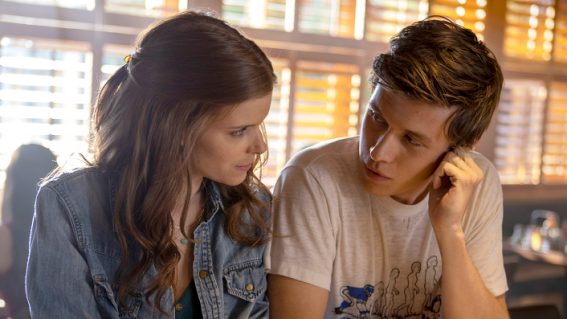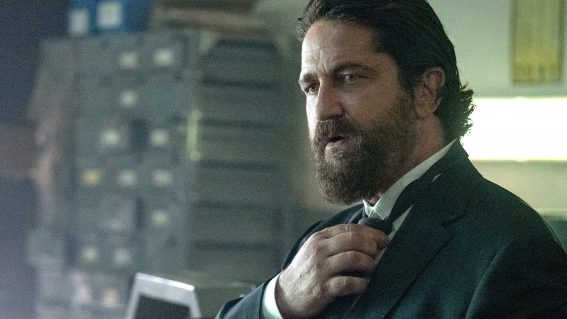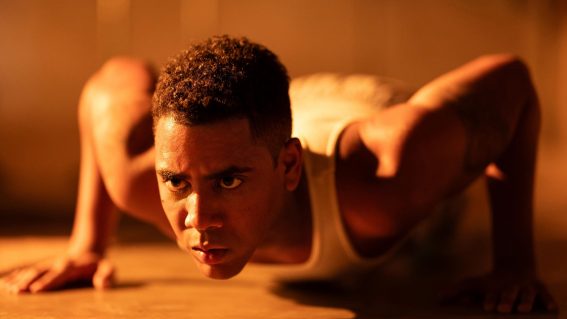I May Destroy You is a brilliant drama about power, consent and trauma
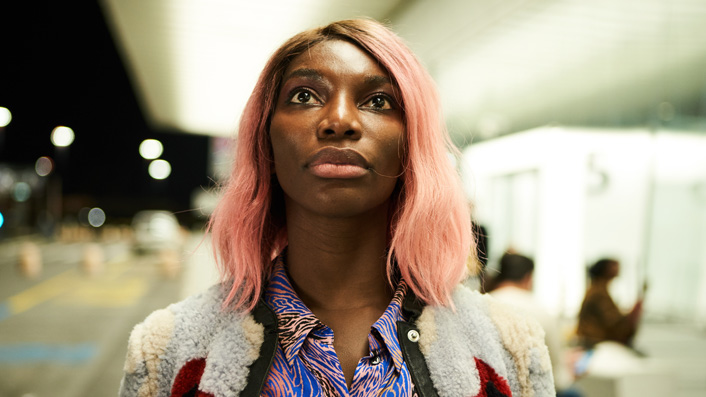
The hugely acclaimed 12-part drama I May Destroy You (now streaming on Binge) is one of the best new shows in a long time. Amanda Jane Robinson explains why you should be watching (Note: this article contains mild plot spoilers).
CW: I MAY DESTROY YOU DEPICTS SEXUAL ASSAULT AND ITS AFTERMATH, WHICH IS DISCUSSED IN THIS STORY
Drawing on the anecdotes of friends as well as her own sexual assault in 2016, Michaela Coel’s 12-part series I May Destroy You revolves around the night micro-influencer and author Arabella is drugged and raped hours before her book draft deadline. Episode by episode, Arabella attempts to detangle her muddy recollections surrounding the night of her rape while simultaneously working on her book and trying to accept the compassion of her two closest friends, Terry (Weruche Opia) and Kwame (Paapa Essiedu).
In some ways the show is a crime procedural, working backwards from victim testimony. But it’s not a whodunnit, or at least, that’s never the question that matters. It’s difficult to describe the show’s structure beyond its inciting event, other than that it cleverly mirrors the chaotic, fragmented disorientation of post-traumatic memory. It spirals around on itself, following its instincts and indulging its tangents to brilliant, unanticipated ends.
A nuanced depiction of sexual assault
Billed as a drama about consent, I May Destroy You is a nuanced depiction of sexual assault and the destabilising debris it leaves in its wake, certainly, but it’s more than that, too. It’s a provocative study in memory and miscommunication, exploitation and introspection, and the heinous absurdity of the publishing industry. Throughout the series I was struck by Coel’s astute ability to render microscopic shifts in power more often sensed than noticed, and rarely reproduced on screen. In particular, the dynamic between Arabella and her publishers is expertly portrayed, comical in its strained discomfort.
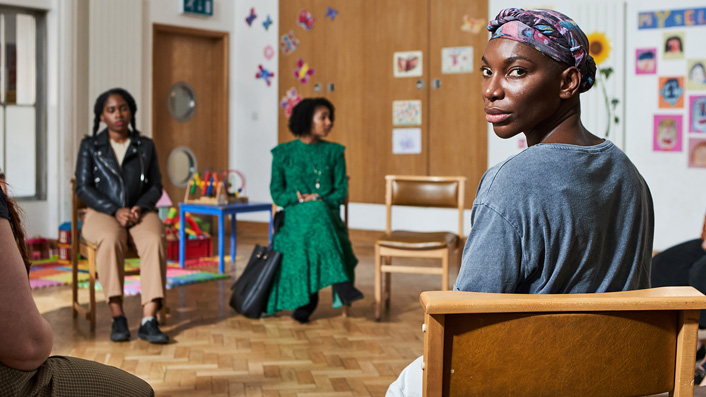
I’ll play you a scene: an early morning meeting, just hours after Arabella’s assault. She slumps in her publishers’ office with no recollection of how she got there, still bleeding. Her commissioners badger her for her draft. Episodes later when she discloses her desire to shift the topic of her book in light of her assault, her publisher simply exclaims, “Rape! Fantastic!”
Arabella’s relationships with Terry and Kwame are healthier, but still have their omissions. Even after Arabella discusses her assault, it takes some time for Kwame to come forward about his. What is never questioned between this trio is their care for one another. “Your birth is my birth,” Arabella says to Terry. “Your death is my death,” Terry replies. It’s a care that reverberates into their separate lives. Even when they’re apart, they think of each other. Often they’ll message or call just to check in, partly as a friend, partly in an effort to distract themselves from their own pain. When Arabella is truly and finally alone, it’s only because she doesn’t have enough data to call Terry.
For a time Arabella is in denial over what has happened to her. She scolds police officers when they validate her hazy recollection of her rape. She scolds herself for dwelling inside her pain. A couple of episodes in, Arabella’s therapist asks how she pulls herself out of intrusive flashbacks. Arabella considers this for a second, then replies: “I just make sure I’m around someone, anyone. And if I’m not, I say there are hungry children, there are hungry children, there are hungry children; there’s a war in Syria, there’s a war in Syria, there’s a war in Syria; or, not everyone has a smartphone, not everyone has a smartphone, not everyone has a smartphone—to remind myself of the bigger picture.”
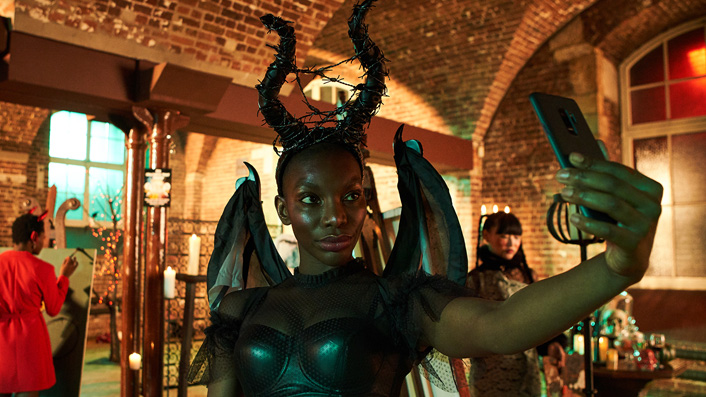
Grappling with social media and mental health
On one level there’s the pain. On another, there’s the spectre of shame that surrounds that pain, pulsing like a heavy echo. So she distracts herself. A true millennial in media, not one to let an opportunity for content pass her by, Arabella begins speaking out about her experiences on Instagram under the guise of empowering others, uploading videos and posing with fans in the street until even that turns ugly. Arguably, I May Destroy You is the first show to successfully grapple with the repercussions of social media on a character’s mental health.
I May Destroy You deals in grey areas and half-truths; consent retracted, boundaries crossed, corrections held back. From the cruel violation of a condom removed unknowingly to the banal agony of a misinterpreted signal, the show constantly contends with the fallout of miscommunication. In one episode, Terry can’t believe her luck when two strangers want to come back to hers for a threesome. Afterwards, she intuits a shift in the mood and it dawns on her: they weren’t really strangers, this was their plan all along, and she fell for it. She can’t prove it, she just has a feeling. Is there anything more damning than a woman with a feeling?
Also intrinsic to the show’s presentation of its themes is that it takes place within a specifically black, British domain. Arabella, Terry, and Kwame are all black Brits, as are many supporting characters. Arabella’s experiences are distinct to her intersecting identities as a straight, black, British millennial woman just as much as Kwame’s experiences are distinct to his circumstances as a gay, black, British millennial man.
In a piece for Vulture, writer Bolu Babalola writes: “Within the show, Black Britishness is everything in that it is treated as nothing—this is to say that it just is. It is less of a lens and more of a feeling that coats the chords of the show. A culture rarely seen in mainstream television, it’s not that Black Britishness (and the specificity of being a Black Londoner) assists in telling the story, nor is it that Black Britishness is its own character within the story. It is that it helps form the story. The rhythm and pulses chug narrative along, enriching the grain of the series. It’s a millennial tale, but it’s a Black British millennial tale.”
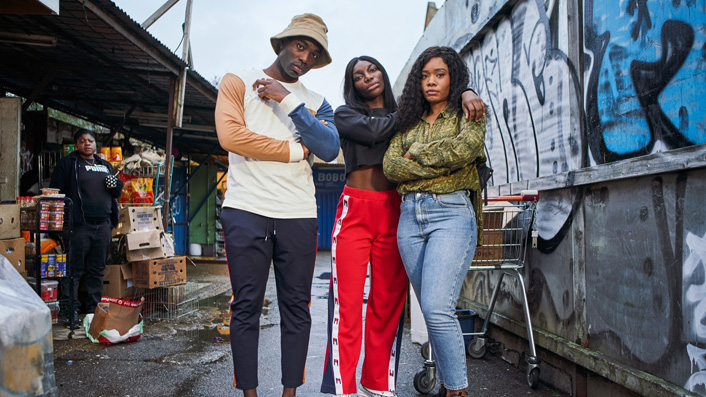
The characters speak in black British slang
It matters that the characters speak in black British slang, because of course they would. It matters that they live in the city, otherwise they may not have such ready access to Tinder and Grindr hookups. It matters that Arabella mentions she’s never dwelled on the disadvantages of being a woman, because she’s been too busy being black and poor. It all matters.
In one story thread, Kwame and a hookup discuss the fact that they both live at home, meaning that if they want to sleep together they’re going to need a third who can accommodate, complicating and, in this case, endangering the pair. In this way race, class, gender, and sexual politics further the show’s narrative complexity rather than simply serving as a point of conversation or character backstory, and it’s in this synthesis of theory and story that Coel’s skill becomes undeniable.
Comparisons to Fleabag are easily drawn; both are British series about the way trauma shapes us, and both are written and performed by complex, chameleonic women. Coel also co-directed most episodes. More than any other television show, however, I May Destroy You seems to most closely resemble Fiona Apple’s album Fetch The Bolt Cutters, released four months ago. It’s not just the subject matter—the unyielding horrors of patriarchy, namely rape—that connects the two works. It’s the relentless cycle of pain and catharsis inherent in the process of turning trauma into art, and it’s the end product: a note-perfect balance of rough emotion and faultless, obsessed-over precision. It took Fiona Apple five years to write her album. It took Michaela Coel 191 drafts to write her show.

Coel first found fame in her play Chewing Gum Dreams, and then her show, Chewing Gum. When she initially pitched I May Destroy You in 2017, Netflix offered her a million dollars upfront, but with a caveat: no copyright. She turned them down, eventually striking a deal with BBC and HBO where she retained copyright and full creative control. Writing all the episodes herself sans writers room, it’s hardly a stretch to call her a genius. In the same way Arabella found catharsis in the work of writing, Coel, too, used her work as an effort towards healing. As an actress, her aptitude to move from a gut punch to punchline in a split second is totally captivating. She’s magnetic on screen, that inimitable face, so deftly communicating regret, sorrow, and utter delight, often all in the same scene.
When police inform Arabella her case is being closed, her devastation is palpable. What to do with all that messy aftermath? But she’s a different person now, nine months on from the assault. The trajectory of Arabella’s relationship with her trauma recalls Leslie Jamison’s seminal essay, The Grand Unified Theory of Female Pain: “She’s hurting, but that doesn’t mean she’ll hurt forever—or that hurt is the only identity she can own. There is a way of representing female consciousness that can witness pain but also witness a larger self around that pain—a self that grows larger than its scars without disowning them, that is neither wound-dwelling nor jaded, that is actually healing.”
Water is a key motif and metaphor
In a handful of scenes throughout the show, a doppelgänger lurks in the shadows, a physical manifestation of Arabella’s greatest fear: herself. She appears, hovering above her own bed like a sleep paralysis demon. Arabella is terrified of her own power, her own rage. She can sense it coming, the ocean drawing back like the moments before a tsunami. In a video for GQ, Michaela Coel speaks of her fascination with water, the sheer power of the ocean and the fact that water makes up 70% of the human body. In the beginning of the series, Arabella sits on the beach, flinching as a wave approaches. Near series’ end she’s wading in deep. She’s quit talking herself out of her instincts. She’s coming into her power.

In her review of the show for The New Yorker, Doreen St. Felix posits: “At its best this show is abrasively psychological; it is, as all good art can be, “triggering,” because it sounds and feels and moves the way we do. In Coel’s universe, as in ours, pleasurable experiences are everywhere imperilled, always risky, always subject to audit.” While the show may be too difficult to watch for some, it is this very ability to upset that proves the accuracy of its depiction, and it’s the desire to sit in this discomfort that is encouraged by Coel and Arabella alike.
It’s tough to say much about the show’s finale without dampening its effect. For a while I wasn’t sure where it was going. Of course, I should have trusted Coel to surprise, as always. All I’ll say is, I can’t remember another piece of television that so utilises a clunky conventional form to its full potential, aptly questioning the traditional rape revenge narrative and instead attempting to contend with the true scope of closure. Expertly crafted and brutally alive, I May Destroy You is the best new show in a long time.




